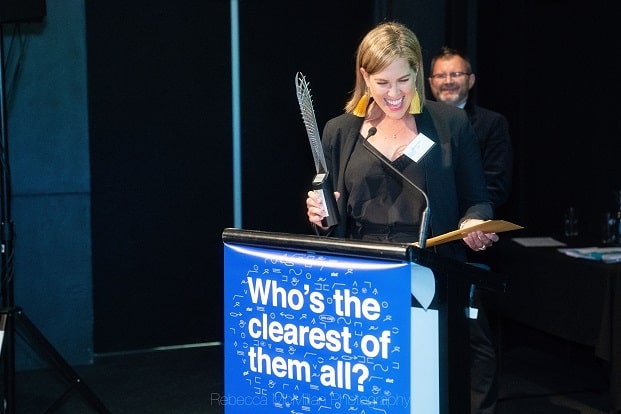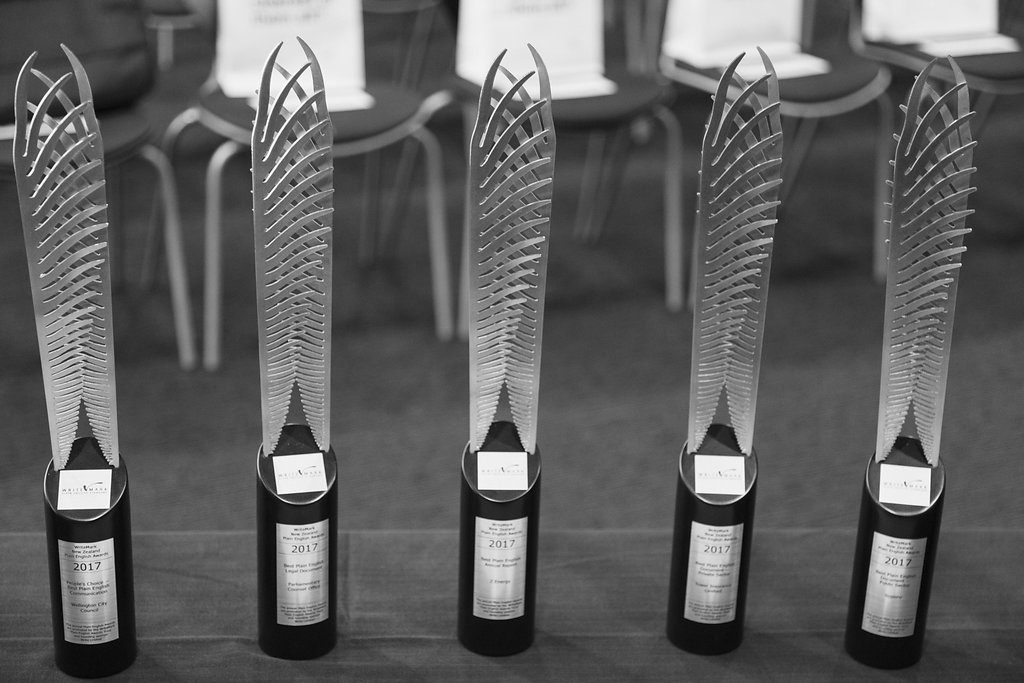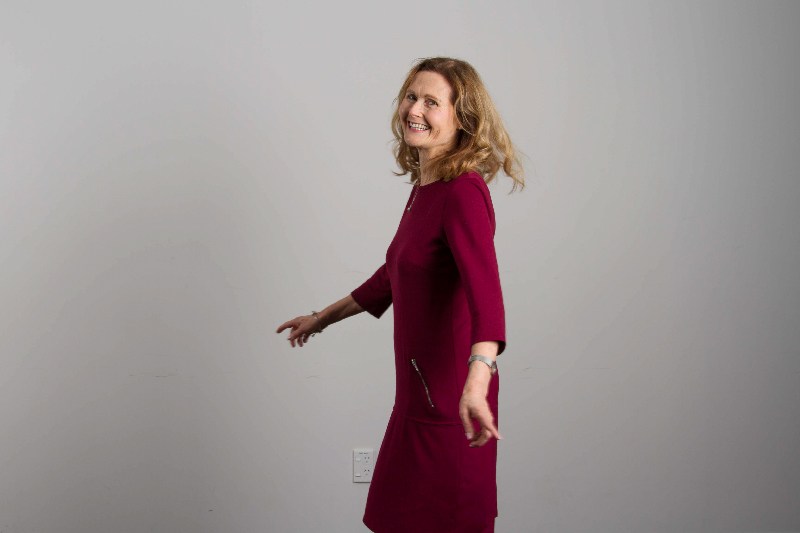
Have you heard the news? Our judges have chosen their finalists. Image by Rakicevic Nenad. Pexels license.
They said it wasn’t an easy task. However, after running over their shortlisted entries with a fine-tooth comb, our judges have settled on this year’s finalists.
Who are our Best finalists?
The following nominations are finalists in our People’s Choice — Best Plain English Communication category:
Who are our Brainstrain finalists?
The following nominations are finalists in our People’s Choice — Worst Brainstrain category:
- Auckland City Council — Proposed Plan Change letter
- Christchurch City Council — Te Wai Ora o Tāne Draft Integrated Water Strategy
- Rabo Capital Securities Limited — Redemption Notice letter
What happens next
Our judges in each category will now review their selected entries and decide on a winner. Our media partner, Newsroom, will announce this year’s winners on their website on Thursday, 28 November.
Rhiannon Davies October 18th, 2019
Posted In: 2019 People's Choice Awards, Brainstrain, Finalists, Industry awards
Tags: Best Plain English Communication, Finalists, People's Choice 2019, Worst Brainstrain

'We worked for 3 years to get this!' Winner of the Best Plain English Document — Private sector Jacqueline Taylor celebrates her success. Photo by Rebecca McMillan Photography.
What an amazing ceremony last night! Congratulations to all our 2018 winners — you deserved all the recognition you got. The feedback you each received from your judges truly shows that plain English is alive and kicking in New Zealand. It also shows that, as a Trust, we’re making great strides towards fulfilling our goals.
‘Keep going and spread the word!’
A special mention to the winners of our Plain English Champion — Best Individual or Team category. The work that’s gone into the Better Letters Project at the Ministry of Social Development is seriously changing the lives of everyday New Zealanders.
Our judges got it right when they said, ‘Keep going and spread the word! Imagine what New Zealand’s public service might look like if every government department took this approach!’
Find out about this year’s winners
Take a look at photographer Rebecca McMillan’s wonderful photos of the ceremony
Melissa Mebus November 16th, 2018
Posted In: 2018 awards ceremony, 2018 winners, Finalists, Social good, Winners
Tags: 2018 Plain English Awards, 2018 Winners, Champion, clear communication, People's Choice

It's time to celebrate this year's winners! Image by Adi Goldstein on Unsplash
Tickets are available now for this year’s Plain English Awards ceremony
Where? City Gallery Wellington
When? Thursday, 15 November
Come along and celebrate at this year’s ceremony. Join finalists, judges, sponsors, and other supporters for an evening of fun, festivity, and above all celebration.
Wellington Mayor Justin Lester will give an opening address at 5.30pm. And lawyer and comedian James Elliott will be our MC for the evening. Financial advisor, wealth coach, and author Martin Hawes will also return as a guest speaker.
You’ll have a chance to mix and mingle, with drinks and canapés, following the official segment of the ceremony.
Get your tickets now!
Melissa Mebus October 25th, 2018
Posted In: 2018 awards ceremony, 2018 Plain English Awards, Finalists, Winners
Tags: 2018 finalists, 2018 Plain English Awards, Celebration, Industry awards, winners

They're the sparkle on the plain English cupcake. Well done to this year's finalists. Photo by Audrey Fretz on Unsplash
Our judges have announced this year’s finalists. Find out who they are here
What makes an entry good enough to become a finalist? According to our judges, it’s all about being like this:
- ‘Overall, we have a strong example of how a company can take complex information and share the details both with clarity and with compelling storytelling. Kudos!’
- ‘I would certainly use this product as an example of effective plain writing and information design.’
- ‘This is an exemplary document.’
Now the countdown begins to our Awards ceremony on Thursday, 15 November, where we’ll announce and celebrate this year’s winners. Watch this space for details about how to get tickets.
Melissa Mebus October 18th, 2018
Posted In: 2018 Plain English Awards, Finalists, Plain English Awards
Tags: 2018 finalists, 2018 Plain English Awards, Industry awards, People's Choice

A beautiful handmade trophy is one of several prizes in store for Accuro Health Insurance. Image by A Beautiful Photo
Our rights and obligations are enshrined in the law. But we can’t claim those rights or fulfil those obligations if we don’t understand them. Understanding truly is power. It unlocks our democratic rights.
That fact is recognised in the Plain English Awards category, Best Plain English Legal Document.
Last year’s winner sets the standard for legal drafting
The document that won last year was a mammoth effort. A team from the Parliamentary Counsel Office (PCO) combined twelve Acts into one: the Contract and Commercial Law Act 2017.
The judges said, ‘Parliamentary Counsel Office did a great job of combining multiple acts that were a confusing hodgepodge of legislation into a single intelligible act.
‘A clear understanding of the audience and consultation with these groups made the project stronger. The explanations in the legislation were particularly useful.
‘The revised Act is a great step forward in New Zealand for plain English legislation. And the intended audience has a much clearer picture of contractual law in New Zealand.’
You can enter any kind of legal document
Are you thinking of entering this Awards category? The 2017 winner is a hard act to follow, but don’t feel you have to try, says Awards organiser Melissa Mebus.
‘Any kind of legal document is worth entering — whether it’s long and complex or short and simple. The important thing is that it’s about a legally enforceable law, process, obligation, or right. Examples are contracts, T&Cs, notices, and legal opinions.’
Plain English legal writing brings business benefits
The tide is turning in favour of plain English in legal writing in New Zealand and overseas. Plain language practices report happier clients and increased business. And plain English can bring unforeseen benefits, with more clients meeting deadlines just one example.
One document, two entries
The PCO team also entered the rewritten Act in the Best Plain English Turnaround category, where it was shortlisted. Melissa says, ‘We welcome multiple entries for the same document. A good document or website can tick many plain English boxes, and should get the recognition it deserves.’
To enter, you have to submit the original document or webpage as well as the rewrite. The rewrite must be in current use.
Improve your chances of winning an award
Find out how to give winning your best shot at the Awards Trophy Tips Seminar on Friday, 4 May. You’ll get expert advice from past winners, judges, and supporters of the Awards. Attendance is free — book for the Trophy Tips Seminar online.
Entries now open on Monday, 7 May
We said we’d open on 1 May but we need a little bit of extra time as we upgrade to a new entry platform. Watch for entries opening next Monday, 7 May. Entries close on Friday, 31 August.
Melissa Mebus April 30th, 2018
Posted In: 2018 Plain English Awards, Finalists, Legal writing, Plain English Awards, Trophy Tips Seminar
Tags: 2018 Plain English Awards, Best Legal Document, Legal writing, Trophy Tips Seminar

Information for new migrants needs to be as clear and user-friendly as possible. Image by Dmitri Ratushny. Unsplash licence.
You’ll all be familiar with the idea of the world becoming smaller as fast-paced communications connect even the remotest places on earth to the wider world. With the click of a button we can instantly be in touch with someone as far afield as Siberia in the far north and Antarctica in the far south. But does the amount of communicating we’re doing necessarily mean that we’re understanding each other?
What if I just speak a little louder?
I don’t have to dig too deep into my own experiences of travel outside New Zealand to know how difficult a language difference can make life. I even remember once falling into the dire trap of increasing my volume to try to get my message across. How was that ever going to work? Luckily for me (but not the poor person I was talking to), our topic of attempted conversation wasn’t too important.
So what must life be like for the many migrants who make their way to New Zealand each year and don’t speak English fluently? To put things in perspective, a quarter of New Zealand’s population was born overseas. And for many of these people, English is their second — or even third — language. Imagine what these statistics mean for an organisation like Immigration New Zealand (INZ), which needs to communicate ideas, many of them complex, through a variety of mediums every day.
What plain English means for migrants to New Zealand
At the end of November last year, supporters of the annual Plain English Awards celebrated its 2017 winners at a ceremony in Wellington. INZ was one of the Awards’ valuable sponsors, and representative Anne-Marie Masgoret gave a brief address during the ceremony. While no one in the audience needed any reminding of the importance and value of plain English, Anne-Marie’s words served as terrific reinforcement.

Anne-Marie Masgoret, right, from sponsors Immigration New Zealand, with winners Anthony Frith and Bridget Cheesman.
‘Moving to live and work in a new country involves finding out a great deal of information that locals simply take for granted,’ Anne-Marie explained.
Focusing on user-friendly information
INZ’s goal is to help migrants make New Zealand their home. They aim to support these people to fully participate in and contribute to all aspects of New Zealand life. And they do this by communicating clearly and simply through a variety of mediums.
INZ also relies on other organisations to deliver their message directly to migrants.
‘New Zealand organisations are very good at providing newcomers with information. However, the information provided is not always written in a user-friendly way,’ said Anne-Marie.
‘For those new to New Zealand, the quality of information migrants receive as they settle into their new life here can make all the difference in the way they settle into this country and make it their home. It can also make a difference to whether a newcomer acts on information or just ignores it.’
Keeping it clear for those new to New Zealand
To support organisations to write clear communications, INZ created the Keeping It Clear resource. This aims to help organisations create or rewrite information in a short, simple, and easy-to-understand format.
Check out INZ’s Keeping it Clear resource
Find out about the winners of the 2017 Plain English Awards
Melissa Mebus March 1st, 2018
Posted In: Finalists, Plain English Awards, Sponsors
Tags: Plain English Awards, sponsors, Turnaround Award
WriteMark Plain English Awards founder, Lynda Harris, gave a stirring speech to a sell-out audience at the 2017 Plain English Awards. She encouraged us all to think bigger and do more. Here’s what Lynda said.

Lynda Harris
Annual awards reward and motivate
Twelve years ago we had the bold idea of publicly honouring those organisations that were really trying to make important information clear.
And it worked.
Not only do we have plentiful anecdotal evidence about the motivating effect of the annual Plain English Awards, but we also have a ton of great comments in the surveys we’ve done.
‘The Awards help motivate us to get it right for the people that need good information the most.’
It becomes very real when we see forms that are easy to fill out; contracts and conditions made straightforward; and vital healthcare information written in a reader-friendly way.
We love comments like these: ‘We finished by lunchtime what would normally take us all day.’ Plain English makes everyone’s life easier!
Struggling to find support
But a lot of the work has been done by not many people. Even though more organisations are producing reader-friendly publications, not enough people in those organisations understand the power of clear communication and its potential to transform organisations and lives.
The people who do understand often beaver away on their own or in a small group with little support. Often they retreat a bit and accept that there is only so much they can do.
That’s a huge opportunity lost, and and a massive consequence cost.
A dose of inspiration with positive side effects
I have to admit I was in this frame of mind recently when I got a dramatic and unexpected dose of inspiration from two remarkable speakers. They shared an incredible story, which reminded me that if we believe in the worth of something, we can inspire others to join us and make something big happen. It made me think of the Marianne Williamson quote, ’Your playing small does not serve the world’.
I want to share a snippet of that inspiring story with you — with the not-so-secret agenda that I want you to realise you have the desire and the power to do more!
This is the story of 19-year-old Australian Daniel Flynn and his two friends, who came up with the audacious plan to end world poverty in their lifetime. They’d seen a documentary about children in other parts of the world dying every day from a lack of clean water. Their plan was to start a bottled water company, and use 100 percent of the profits to create clean water and sanitation projects where they were needed most.
Impossible is an opinion
Of course people said it was impossible.
Daniel said, ‘Impossibility is only someone’s opinion, not a fact.’
Most of the people Daniel pitched to, and plenty more besides, said, ‘It won’t work.’
Daniel said, ‘But what if it does?’
They started with $1,000 between them and zero experience in anything to do with business, overcoming obstacles of every sort, and asking Google ‘How to start a bottled water company?’
Eight years on, still in their twenties, they are running a very different and highly successful company with no investors, no shareholders, and no debt: a company that gives 100 percent of its profits away.
They have given $5 million to provide water and sanitation services for 441,530 people, and food aid for 124,737 people. They have humanitarian projects running in 18 countries.
And they did it through an unwavering belief in the good they could do, sharing that belief boldly and creatively. They built a community who believed with them. And they called their company ‘Thankyou’.
Borrow boldness for what you believe in
Listening to Daniel and his wife speak, I felt a new-found energy for everything I believe in. ‘If these young people can do so much, starting with nothing more than conviction, what can I do?’ And it’s stayed with me.
I thought of Margaret Mead’s words, ‘Never doubt that a small group of thoughtful, committed citizens can change the world. Indeed, it is the only thing that ever has.’
Which leads me to ask a personal question. In your workplaces, under your influence — thinking of how you currently communicate with each other and give vital information to New Zealanders — what change do you want to see?
What if you were to multiply by 20 (or 100!) the positive effects of the documents and websites entered into the 2017 Plain English Awards? What would it take to do that?
The economic and social good that flows from a focus on clear, meaningful communication is easy to find — in fact, we wrote a book about it.
I’m hoping now that by borrowing some boldness from three young people who are changing the world in mighty ways, you feel inspired to advocate even more strongly for what you believe in.
To do that you’ll need to do something differently, to challenge the status quo, and politely shut your ears to detractors — I truly hope you will!
Nicola Welby December 1st, 2017
Posted In: Awards brand, Finalists, Plain English Awards

From shortlists to finalists — decisions have been tough. Photo by Gaelle Marcel on Unsplash
After some tough deliberations from our judges, here are the finalists in the 2017 Plain English Awards.
As with our shortlists, entries are in no particular order. We haven’t published finalists in some categories so we don’t let the cat out of the bag.
‘Ooh — awesome’
Read some of the feedback we’ve had from judges about this year’s finalists below.
- ‘All three judges found this to be the very best group of entries we have seen in our many years judging these awards.’
- ‘We applaud the effort everyone has made to follow the principles of plain writing.’
- ‘You can be especially proud to win this category among these excellent entries!’
- ‘The friendly, light tone in this rewrite is a delight.’
- ‘When I finished the rewrite I said aloud “Ooh – awesome”.’
- ‘Overall this is an excellent effort.’
Winners will be announced on 23 November
We’ll announce our winners at the Awards ceremony in Wellington on 23 November. We’ll also publish the list of winners on our website later that evening.
Nicola Welby October 20th, 2017
Posted In: Awards brand, Communications, Finalists, Plain English Awards
Tags: clear communication, Finalists, Plain English Awards, plain language










